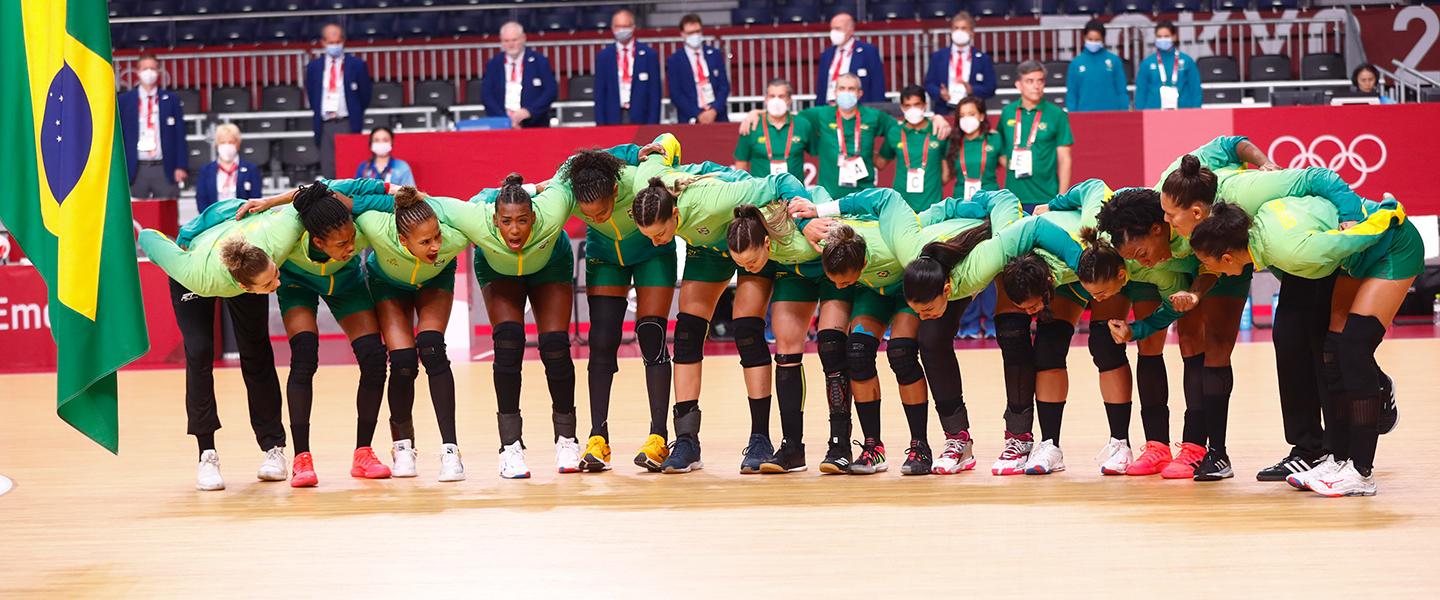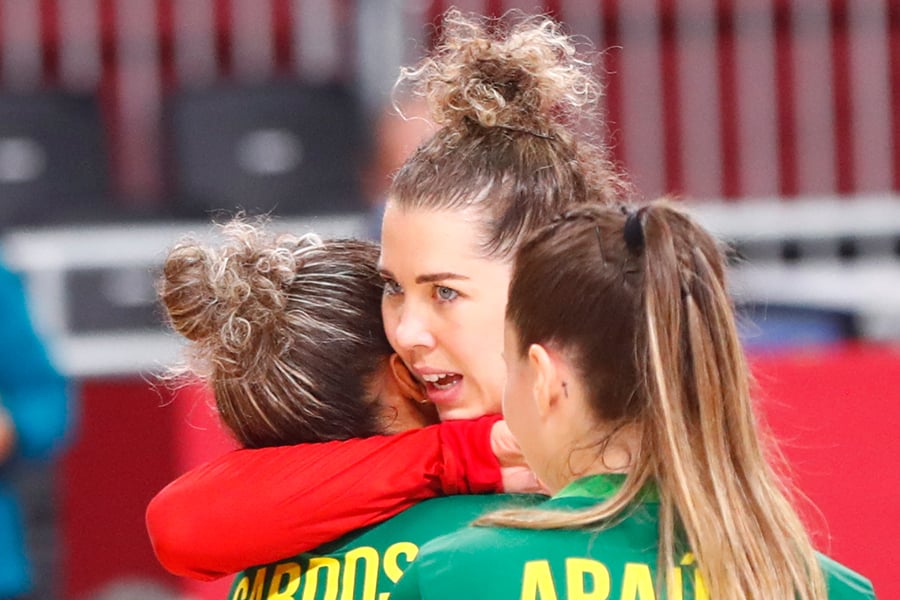Arenhart: “From now on we just want to go for more”
26 Jul. 2021

No result on day one of the Olympic Games Tokyo 2020 women’s handball competition stood out as far as Brazil’s draw against the defending champions, the ROC.
Certainly, it has been six years since the historic Russian gold medal at the Rio 2016 Games, but the results since then also indicated that the European side were the favourites heading into the clash. At the two World Championships held since then, in 2017 and 2019, Russia placed fifth and third, respectively, while Brazil finished 18th and then 17th.
Russia also played the final of the European championship in 2018 and ranked fifth in handball’s most powerful continent at the same event in 2020. Brazil had success in their own continent, winning the 2017 Pan American Championship, the 2018 South and Central American Championship and the 2019 Pan American Games, but the World Championship results are the most telling of the difference between the sides in recent years.
In addition, the teams met at the 2017 World Championship, with Russia winning by eight goals.
ROC were therefore the clear favourites heading into the round 1 match, but Brazil caused considerable and visible frustration for their European opponents, who were far below their usual efficiency in attack in particular. When asked whether the draw was viewed as a reason to celebrate for Brazil, goalkeeper Barbara Arenhart did not hesitate:
“Of course, especially because we were two goals behind in the first half. I think this is such an achievement for us. They are the current Olympic champions. Russia [sic.] is always Russia [sic.]. We have a lot of newcomers in our team for the Olympics, so it is an achievement. We are happy with the point and I think from now on we just want to go for more. We showed to ourselves that we can fight equally with everyone.”
Brazil have been waiting for a major international success since they won their first and only world title in 2013. The bulk of the team that clinched that historic trophy have retired and a new generation have been ushered in, led by the likes of EHF Finals MVP Bruna De Paula, Champions League player Samara Vieira and goalkeeper Renata Arruda.
The rebuilding period has been one reason for the lower rankings at World Championships, despite the presence of players like 2014 IHF World Player of the Year Eduarda Amorim, Arenhart and 2012 IHF World Player of the Year Alexandra Nascimento, all of whom were part of the 2013 world title-winning team. The result versus ROC could indicate that the rebuilding is over and the team are ready to be more competitive with the top squads once more.
“We’ve been training a lot. We are together for such a long time now. I think everything comes from the belief we have. We have a big team with many players that can help and I think we showed this today,” said Arenhart following the opening draw. “We have such a mix of experienced players with young players, with not-so-young players, so hopefully this is going to lead us to a very nice tournament.”
One element of Brazil’s strong performance was their defence, which ROC’s Vladena Bobrovnikova commented was very tricky for her team to play against.
“I think this is our heart. Our game is a lot in our defence. As you could see we are very emotional and this brings us to a point that we have to fight all the time. This is the biggest thing I think we have – our defence is our strength and we believe in it. That is the most decisive moment for us: When they are coming we want to show that we are there in front of them and it’s not going to be easy,” said Arenhart, also commenting on the visible cohesiveness in the team – so important to success in handball.

“We are a big family. We have the big mamas but we also have the big kids. I think it can be seen in the court exactly how we are off it.”
On Tuesday, as their Tokyo 2020 campaign continues, Brazil will meet Hungary, who are also hoping a long rebuilding period is coming to fruition. Hungary are playing their first Olympic women’s tournament since 2008. They were led by four players aged 22 and younger – Petra Vamos and three 2018 Junior world champions: Noemi Hafra, Katrin Klujber and Greta Marton – in their great performance against France in round 1, which ended with a narrow loss.
An exciting match between two teams propelled by experienced players mixed with determined young players can certainly be expected, with both targeting their first victory.
Non-European sides hope for first wins
Tuesday’s Tokyo 2020 action will open with hosts Japan aiming for their first win as they meet 2012 silver medallists Montenegro, who defeated Angola in round 1. Japan succumbed to a clear loss against the Netherlands in their opener.
Later, Sweden, fresh from a strong win against 2019 World Championship silver medallists Spain, will play ROC. World champions the Netherlands will follow, targeting their second victory against record Asian champions Republic of Korea, who were defeated by a surprisingly clear margin at the hands of Norway in their first Tokyo 2020 game.
A battle of continental champions will follow, as European title holders Norway meet African champions Angola in the last Group A game. The day will close with Rio 2016 silver medallists France playing Spain.
Full schedule on Tuesday 27 July
(All times local)
09:00 Japan vs Montenegro – Group A
11:00 Brazil vs Hungary – Group B
14:15 Sweden vs ROC – Group B
16:15 Republic of Korea vs Netherlands – Group A
19:30 Angola vs Norway – Group A
21:30 France vs Spain – Group B

